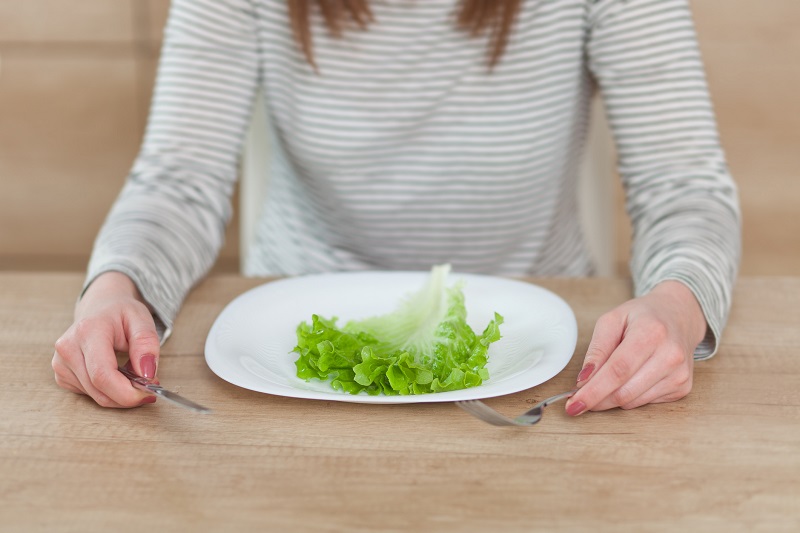You may not be exactly sure what your metabolism is, but you’re pretty sure it has something to do with burning calories and you know you want it to be “fast.” You’ve heard that having a slow metabolism is bad for weight loss. You’re on the right track. Metabolism is basically the engine that keeps your body chugging. It’s a collection of chemical reactions that takes the food you eat and turns it into energy. Fast or slow, it’s always on, even when you’re sleeping, because it keeps your tissues and organs alive and functioning.
And yes, fast is better. Some people are born with fast metabolisms. They seem to be able to eat anything and stay slim. But genetics aren’t destiny. You can play a major role in keeping your metabolism in high gear—and conversely, you can take some measures to ensure you don’t become the victim of a slow metabolism.
Here are a five things that may be contributing to your slow metabolism and how to avoid them:
1. You’re not getting enough ZZZs.

Missing one good night’s sleep may result in a yawn-filled next day but your metabolism will likely be unchanged. But make that a few nights of sleep deprivation, and you could risk turning your metabolic hormones on their heads, according to a number of studies examining the link between lack of sleep and gaining weight (yes, it’s a thing). For one thing, getting too few ZZZs can make your cells less responsive to insulin, the pancreatic hormonal messenger that tips your cells off that it’s time to absorb the glucose (sugar) in your blood stream. If they ignore the message, your blood sugar goes up. Lack of sleep can reduce the production of leptin, the hormone that tamps down your appetite, and also alters the production of ghrelin, the hormone that encourages you to eat.
Very important for dieters: One 2010 study published in the Annals of Internal Medicine found that people whose sleep was restricted to only five and a half hours a night lost less body fat and more lean muscle than when they were allowed to sleep eight and a half hours—all on the same calorie-controlled diet. It may seem outlandish, but not getting enough sleep is a huge contributor to a slow metabolism.
Solution: The Sleep Foundation recommends doing the same thing you may have done with your children when they were babies. Stick to a steady sleep schedule (going to bed and waking up at the same time), have a relaxing bedtime ritual, get some exercise every day (though not within a few hours of bedtime), and make sure your bedroom and bed are conducive to sleep.
2. You’re not eating enough.

We live in a 21st century world where food is always just a few steps away. But our bodies are still designed for the feast and famine years of eons ago. When you cut back too severely on how much you eat, your body is likely to react as if you’re starving and it starts slowing down your metabolism, say researchers at Harvard Medical School. Your body then burns fewer calories, which contributes to a slow metabolism.
Solution: The key thing is to prevent your body from hoarding calories because it senses famine has arrived. You can do that by never skipping meals and by exercising, which helps thwart metabolic slowdown.
How to Eat More without Gaining Weight: Volumetrics Explained
Read More 
3. You’re not exercising.

Speaking of exercise… It’s true that you’re more likely to lose weight by cutting calories than by exercising. Think about it—you can probably cut 250-500 calories out of your diet every day, but to burn that much off you might have to be on the move for an hour or more daily. According to MedLine Plus, regular exercise not only helps you burn calories while you’re active, you’ll continue to torch those pesky calories for an hour or so afterwards.
Solution: Put exercise on your calendar. Sign up for classes three days a week, plan walking dates with family or friends, flick on an exercise video, or go mall walking early in the morning. A recent Duke University study found that cardio—the aerobic exercise that makes you huff and puff—is better for burning fat than weight training. In their study, people who spent all their exercise time on cardio lost weight faster than those who also did weight training.
But include some hefting with your huffing and puffing. Weight training builds muscle, which can boost your metabolism. One recent study conducted by Duke Health found it can boost metabolic rate by about seven percent, and other studies suggest it may keep chugging at a higher rate even when you’re at rest. It’s not a lot, but every little bit helps.
4. You’re eating too much.

Sounds contradictory, but research suggests that just as not eating enough can contribute to a slow metabolism, eating TOO much overwhelms the cells responsible for regulating how your body burns what you eat for fuel, according to research done at Duke University. Those cells are like traffic cops. They keep traffic flowing so your blood sugar remains stable. But when these traffic cops are facing a logjam, everything just moves much more slowly.
Solution: To help your metabolism chug along smoothly, eat smaller, more frequent meals, the researchers say. When you’re on Nutrisystem, you should be eating six times a day.
5 Reasons You Owe It to Yourself to Try Nutrisystem & Start Living Healthy
Read More 
5. You’re stressed to the max.

In one 2014 Ohio State University study, women who dealt with one or more stressors, like arguments or work issues, before consuming a high-fat test meal burned 104 fewer calories after the meal than women who weren’t stressed. The stressed-out women also had higher levels of insulin, the pancreatic hormone that tells your body to store calories as fat, and their fat didn’t oxidize as much (meaning the fat didn’t burn off as much) thereby increasing fat storage. Chronic stress could result in as much as an 11-pound weight gain in a year, the researchers said.
Solution: You can’t always get rid of the things that are stressing you out, but you can change your response to them. About to explode? Take a walk. According to a study conducted by Harvard Medical School, exercise helps by reducing levels of the chemicals your body produces in response to stress.
Can’t get your worries out of your head? Write them down. Studies conducted by the American Psychological Association—including those on students, Holocaust survivors and people who just lost their jobs—have found that journaling about what’s bothering you can help reduce your stress. Need an escape? Try meditation or prayer. According to the National Center for Complementary and Integrative Health, meditation—essentially finding a quiet place and quieting your mind—can reduce stress even among people worried about health problems.
The post Slow Metabolism? Here Are 5 Ways You’re Sabotaging It appeared first on The Leaf.
from The Leaf https://ift.tt/2msBTM2






